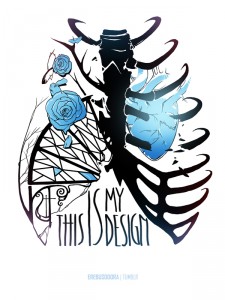To begin, I tried to think about how manipulable words are. We can repurpose them. Words are tools.
If you’ve seen the new tv show rendition of Hannibal, there is one line that echoes in the minds and hearts of viewers:
This is my design…
Will Graham has the ability to empathize with serial killers and reverse each clue of a scene in order to figure out exactly how the victim died. The retelling and categorizing is his design, but it is merely his dissection of the scene. He uses the context to create a narrative.
order to figure out exactly how the victim died. The retelling and categorizing is his design, but it is merely his dissection of the scene. He uses the context to create a narrative.
Likewise, Zolf is concerned with the impact of words–their combined effort and variety of form in cultural, political, socio-economical contexts as well as religious texts like the Bible and the Quran.
So, to start, being influenced by our flarf discussion, I looked up Zolf:
- Zolf- is a hair salon in San Ramon, CA with 57 photos on Yelp.
- Zolf- is also a hair salon at 3/4-10 Bay St, Double Bay NSW 2028, Australia
- There is a Rachel Zolf: a Canadian poet and literary editor and the author of our work today.
- There is a Larry Zolf: a Canadian journalist and commentator. Zolf was born in Winnipeg, Manitoba.
- Zolf- (Japanese: ゾルフ Romaji: zorufu; also referred to as “Mummy Man”) is a sorcerer loyal to Zelgadiss Graywords.
Just as there are many definitions of her last name, there are many ways to look at the Israeli-Palestine conflict.
ROOTS:
Neighbour Procedure is partly a study of linguistics and semiotics. It is a text that is rooted in the very heart of the Israeli-Palestinian conflict: biblical birthright of land. The poems that traverse the pages of Neighbour Procedure are taped, stapled, glued and pressed together, made up of reconfigured and repurposed phrases, words, and meanings from other texts.
This is Zolf’s design…
In an interview Zolf explained that this text is a collage and other than the “if” she added in “a priori” she only has three lines of her own creation. The collaging of words provides a buffer of protection for Zolf and her work in a way. Instead of trying to place herself in the conflict with her own reactions, opinions, etc, she is manipulating those already formed, defined, and established. There is an ongoing discussion right now about individuals like Rachel Dozeal, who posed as an African American woman for the majority of her life. Zolf doesn’t wish to be seen as someone who can fully relate to the Israeli-Palestinian conflict in a fabricated way. Instead, her role is to creatively approach – appropriate words for both a similar and new meaning, or in her words, to be a “medium” rather than an author. She wanted to “engender a deliberate distancing effect” so she wouldn’t muffle the marginalized voice with her own.
WORDS:
Words become so important here then, so in closing, I’ve highlighted a few passages (which I put in italics) where I found her zoom in on this:
pg 8 If jihad is the first word learned
If the space between two words can be bridged
pg 9 If the treasure house of well-worn terms is laden with explosives
pg 16 Aware of the risk these phrases stop vehicles passing by
pg 19 title: The capacity to give names
pg 23 I am illiterate…
Declare this my signature…
24 repetition of car bomb, and insertion of tempo words
25 No Hebrew word for integrity…
30 Names must break up and flatten my foreignness to myself
54 The word ‘Palenstine brought to mind a vague suggestion/ Of a country as large as the U.S. breathtaking/Scenery, beautiful faces and unbelievable destruction/Shocked by the strain of displacement into significant/Experimentations written that thou mayest teach 3284 them
55 Engravings I must try to reduce my ideas of Palestine
61 A matter of reading actually he is doing…Translating…
65 SHUGGA–there is NOTHING to be discussed hebrew and arabic writing are both pretty looking serious talks might begin if both sides used the (‘epoche’) of husserl…
…Calling you names is worthless vicodin in the water system…
66 “Grounds for Deletion” – discusses Racist remarks…terms…phrase(s)…
Amanda, I like your comparison of the name meanings to the ways of looking at the conflict, I have been struggling to get a handle on it and your comparison very much helped me! Also I think understanding that it is a “collage” of words helps with understanding too. The distancing effect you wrote about is a very powerful thought. I think it would interesting to compare her to the other authors we have read who have used other texts. Place and Goldsmith in particular seem to do the exact opposite of what Zolf is trying to do. Very interesting!
With regard to RZ’s positioning, I think it is worth noting that she identifies as a Canadian, Lesbian, and Jew. So while not a citizen of Israel she is involved or potentially linked with it in the sense that as a homeland for Jews she is eligible to become a citizen. This is a very different relationship to nation/identity from that experienced, say, by an Italian American who might see the home country with nostalgia but does not belong to it or is not claimed by it.